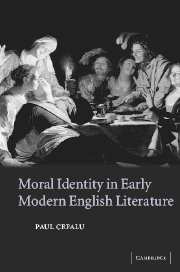Book contents
- Frontmatter
- Contents
- Acknowledgments
- Introduction: English Protestant moral theory and regeneration
- Chapter 1 Shame, guilt, and moral character in early modern English Protestant theology and Sir Philip Sidney's Countess of Pembroke's Arcadia
- Chapter 2 The three orders of nature, grace, and law in Edmund Spenser's The Faerie Queene, Book II
- Chapter 3 Conformist and puritan moral theory: from Richard Hooker's natural law theory to Richard Sibbes's ethical occasionalism
- Chapter 4 The elect body in pain: Godly fear and sanctification in John Donne's poetry and prose
- Chapter 5 Absent neighbors in George Herbert's “The Church,” or Why Agape becomes Caritas in English Protestant devotional poetry
- Chapter 6 Moral pragmatism in the theology of John Milton and his contemporaries
- Epilogue: theorizing early modern moral selfhood
- Notes
- Index
Chapter 1 - Shame, guilt, and moral character in early modern English Protestant theology and Sir Philip Sidney's Countess of Pembroke's Arcadia
Published online by Cambridge University Press: 22 September 2009
- Frontmatter
- Contents
- Acknowledgments
- Introduction: English Protestant moral theory and regeneration
- Chapter 1 Shame, guilt, and moral character in early modern English Protestant theology and Sir Philip Sidney's Countess of Pembroke's Arcadia
- Chapter 2 The three orders of nature, grace, and law in Edmund Spenser's The Faerie Queene, Book II
- Chapter 3 Conformist and puritan moral theory: from Richard Hooker's natural law theory to Richard Sibbes's ethical occasionalism
- Chapter 4 The elect body in pain: Godly fear and sanctification in John Donne's poetry and prose
- Chapter 5 Absent neighbors in George Herbert's “The Church,” or Why Agape becomes Caritas in English Protestant devotional poetry
- Chapter 6 Moral pragmatism in the theology of John Milton and his contemporaries
- Epilogue: theorizing early modern moral selfhood
- Notes
- Index
Summary
In the Chrysanthemum and the Sword, Ruth Benedict famously argued that shame cultures typically rely on “external sanctions for good behavior,” while guilt cultures rely on an “internalized conviction of sin” as a means to cultivate ethical discipline. Anthropologists and philosophers have followed Benedict in maintaining that the typical moral agent in a shame culture strives to cultivate Homeric and classical Greco-Roman attributes such as pride, honor, and reputation. As a moral emotion, shame is often held to be more social and heteronomous in nature than guilt, more intimately connected to one's extrinsic character and behavior than one's interior life and conscience. Unlike the experience of guilt, which derives from a sense of transgressing moral or legal rules and precepts, and can be alleviated through reparation, the experience of shame is often intractable: it follows not simply from a moral lapse, but from a sense of an abiding defect in one's public character.
Such a comparison between shame and guilt has often been used to characterize the differences between pagan and Christian cultures. According to the widely held view (overlooking for the moment doctrinal differences in emphasis), the Christian tradition holds that guilt represents both the sinner's inherited, ontological status (the guilt of original sin) and an occurent emotion that follows acts of disobedience against divine, natural, and scriptural law. In his discussion of the historical origins of religious guilt, Paul Ricouer remarks that “guilt designates the subjective moment in fault as sin is its ontological moment. Sin designates the real situation of man before God, whatever consciousness he may have of it … Guilt is the awareness of this real situation.”
- Type
- Chapter
- Information
- Moral Identity in Early Modern English Literature , pp. 17 - 46Publisher: Cambridge University PressPrint publication year: 2004



